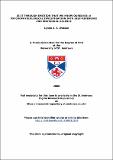Files in this item
Is it through emotion that we know ourselves? : a psychophysiological investigation into self-reference and emotional valence
Item metadata
| dc.contributor.advisor | Jentzsch, Ines | |
| dc.contributor.author | Watson, Lynn A. S. | |
| dc.coverage.spatial | xii, 242 p. | en |
| dc.date.accessioned | 2008-10-21T14:03:47Z | |
| dc.date.available | 2008-10-21T14:03:47Z | |
| dc.date.issued | 2008-06-26 | |
| dc.identifier.uri | https://hdl.handle.net/10023/535 | |
| dc.description.abstract | The aims of the present thesis were two fold. The first aim was to investigate the relationship between self-referential and emotional processing. The second aim was to investigate the extent to which self-referential processing is altered as a function of mood. In order to address these two aims, a variety of behavioural and physiological measures were recorded and a new methodology was employed in the following experimental chapters. The aim of experiment one was to investigate how non-dysphoric and dysphoric individuals evaluate the emotional valence and self-referential content of word stimuli at a behavioural level. A self-positivity bias was identified in non-dysphoric individuals, positive words were rated as self-referential and negative words were rated as non-self-referential. Compared to non-dysphoric individuals, dysphoric individualsâ evaluations of self-reference but not emotional valence were altered. Event-related potentials (ERPs) were employed in experiment two to investigate self-referential processing at a neural level. A two stage model of processing was identified in which, an evaluation of emotional valence was found to occur prior to an interaction between self-reference and emotional valence. A self-positivity bias was identified in the ERP component known as the N400. ERP waves were more negative going to self negative and non-self-positive words when compared to self-positive and non-self-negative words. This bias was explained in terms of the semantic mismatch hypothesis. The aim of experiment three was to investigate how the neural processing of self-referential and emotional information is altered as a function of mood. Differences between nondysphoric and dysphoric individuals were identified during the early stages of ii processing in an emotion task. Between group differences were identified during the later stages of processing in a self-reference task, around 400 ms. Skin conductance and heart rate were employed in experiment four to examine autonomic responses during self-referential and emotional processing in healthy individuals. Both decision-making tasks were found to elicit similar physiological responses. These findings were taken to suggest that a large component of self-referential processing involves the processing of emotional information. Finally, the aim of experiment five was to investigate if person-referent processing was altered during the experience of a negative mood. The behavioural and neural responses of non-dysphoric and dysphoric individuals were compared across self-referent and other-referent decision-making tasks. Between group differences were specific to the self-reference task at the behavioural level. However, group differences were identified in both the self-referent and other-referent tasks at the neural level. The results provide partial support for the hypothesis that negative mood is associated with specific impairments in self-referential processing. Overall the results of the present thesis illustrate that the processing of emotional information plays a large role in self-referential decision-making. Furthermore, the N400 was found be involved in this type of decision-making at the semantic level. Negative mood was associated with greater changes in self-referential processing than in other forms of emotional or person-referent processing. In the final chapter, a two stage model is proposed to account for self-referential processing. The implications of this model are discussed in terms of two macro-cognitive theories, interacting cognitive subsystems (ICS) and SPAARs. Finally, the limitations and future directions for developing this line of research are outlined. | en |
| dc.format.extent | 2173556 bytes | |
| dc.format.mimetype | application/pdf | |
| dc.language.iso | en | en |
| dc.publisher | University of St Andrews | |
| dc.subject | Self-reference | en |
| dc.subject | Emotional valence | en |
| dc.subject | Mood | en |
| dc.subject | EEG | en |
| dc.subject | Self-positivity bias | en |
| dc.subject | Psychophysiology | en |
| dc.subject.lcc | BF698.9E45W2 | |
| dc.subject.lcsh | Personality and emotions | en |
| dc.subject.lcsh | Self-perception--Testing | en |
| dc.subject.lcsh | Mood (Psychology)--Testing | en |
| dc.subject.lcsh | Psychophysiology | en |
| dc.subject.lcsh | Electroencephalography | en |
| dc.title | Is it through emotion that we know ourselves? : a psychophysiological investigation into self-reference and emotional valence | en |
| dc.type | Thesis | en |
| dc.contributor.sponsor | University of St Andrews. School of Psychology | en |
| dc.type.qualificationlevel | Doctoral | en |
| dc.type.qualificationname | PhD Doctor of Philosophy | en |
| dc.publisher.institution | The University of St Andrews | en |
| dc.publisher.department | University of Strathclyde | en |
This item appears in the following Collection(s)
Items in the St Andrews Research Repository are protected by copyright, with all rights reserved, unless otherwise indicated.

